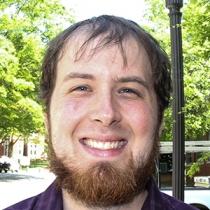
Nicholas P Breen
After you graduate, what is your next adventure?
I will be continuing work that I've been doing in graduate school as a research engineer II in GTRI's Aerospace Transportation & Advanced Systems Lab in the Aerospace Acoustics Technology Division in Smyrna. The main focus will be jet acoustics, but I'll be doing different things - data analysis, setting up sensor tests to measure air speed.
What about your next adventure are you most looking forward to?
The reason I wanted to continue working at GTRI is that I didn't want a desk job only. I wanted hands-on experience, acquiring the data that I will end up analyzing at a desk. At GTRI I've been able to do a lot of both, and that's made this transition pretty seamless.
Did you have any previous co-op, internship, or research experience in this area?
Co-ops can give you a lot of experience, depending on who the sponsor is and who you are working with. The great thing about Tech is that there are a lot of projects going on. I did five or six co-op terms as a student at Tech, but I first got involved in research when I was in high school, where the magnet school I attended -- Kennesaw Mountain High School - sent me on an internship at GTRI my senior year. I built a fiberglass wing and what I now know, looking back, were some very simple lift-and-drag versus angle of attack tests. Even in high school that internship showed me the value of co-opping. I knew co-ops would give me the real-life experience that a lot of jobs would demand. As an undergrad, I also found that co-ops gave me a breath of fresh air, a semester when I'd learn a lot by doing work in the lab. I wouldn't have to worry about tests or grades.That was a great break.
My sophomore year I worked with an AE research engineer, testing aero optics by shooting light through a wind tunnel. I ran some small-scale tests, collected data, and set up a trip to a larger wind tunnel at NASA Ames. I also honed my MatLab skills and learned SolidWorks and LabView software. I helped to rebuild the anechoic chamber and learned how to use power tools and to put a pipe together.
Dr. Ahuja got me really involved in undergrad research, It started off with me learning how to use the beanformer -- an instrument that has an array of mics that are used to detect the location of a noise. We upgraded it from 24 to 48 mics which really helped to see how it worked. It helped me to find a dissertation topic ["Comparison Between Beamforming and Nearfield Contours for Source Location in Subsonic and Supersonic Jets of Various Geometries"].
How did your educational experience at Georgia Tech help you to achieve your goals?
For me, the classes were definitely necessary, because you have to develop a solid foundation, but most of what I use today was learned while I was in the lab. I learn best by example, by hands-on experience. Even in class, when we did examples on the board, I did better. And I got that opportunity at Tech, which made all the difference. Now, that said, the rigor of Tech prepares you to tackle the issues you'll face in industry. It disciplines your mind to think the right way. And you learn how to work with other engineers on group projects, which is really important.
What advice would you give to an underclassman who would like to follow the same path?
Georgia Tech is a relatively small, walkable campus. The best way to take advantage of it is to go out and meet people, talk to them about what they are doing, get their world view. You'll never have the same opportunity to meet people outside your circle, your industry. I had a co-op friend I met at Boeing, and a couple of others -- one from ChemE and another from nuclear engineering-- and we talked about everything we did, our work, our struggles, everything.
The other thing I cannot stress enough is: co-ops. There's nothing more valuable than real-world experience.